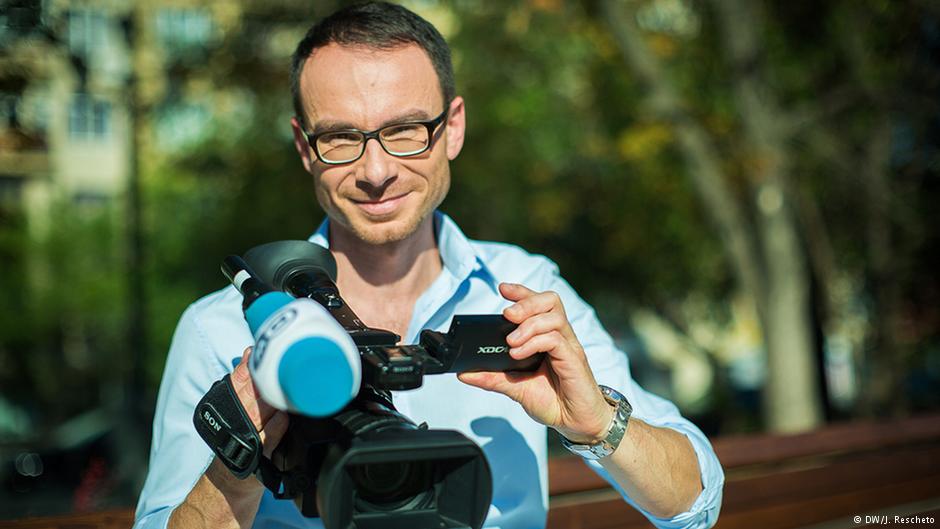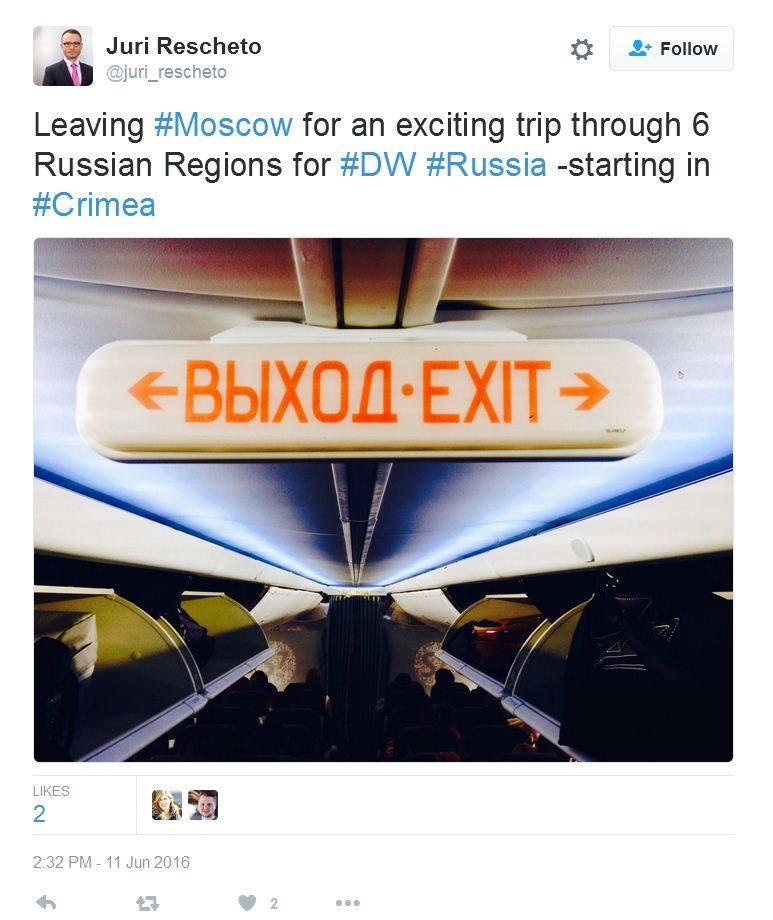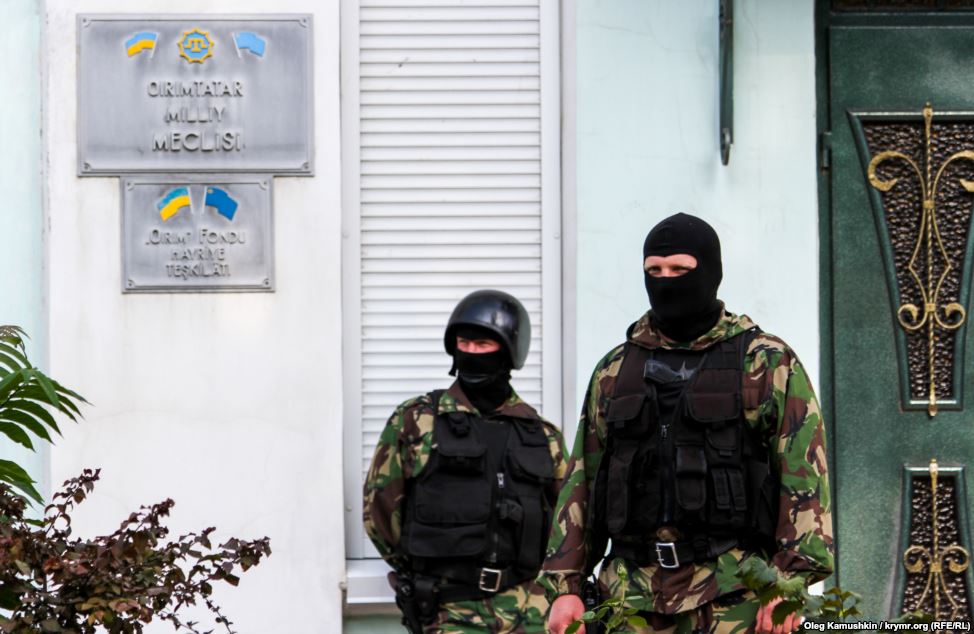The Moscow bureau chief of Deutsche Welle, Juri Rescheto, has become the subject of a media scandal after posting several texts with the hashtag #crimeaisrussia.
On Tuesday, August 16, the Ukrainian Ministry of Foreign Affairs published a statement on its Facebook page from the editorial board of the German international broadcasting company Deutsche Welle (DW). The statement cites an apology by the Moscow Bureau Chief Juri Rescheto for using the controversial hashtag and states that DW considers Crimea as Ukrainian territory illegally occupied by Russia.
Ukrainian readers may find it hard to understand what this is about since they have seen only the end of the scandal. The beginning unfolded in the German language segment of social media and therefore has not been much noticed by Ukrainian media.
The press tour to Crimea
 The story began with a press tour to Crimea organized in Russia for journalists in foreign media. The goal was clear: to convince international journalists that the peninsula is supposedly flourishing after the annexation. Russians are quite skilled at creating Potemkin villages.
The story began with a press tour to Crimea organized in Russia for journalists in foreign media. The goal was clear: to convince international journalists that the peninsula is supposedly flourishing after the annexation. Russians are quite skilled at creating Potemkin villages.
Rescheto was one of the journalists invited on the tour. As noted in his DW profile, he has "a Russian soul and a German view on the topics he covers." This is rather ironic in light of the subsequent events.
In short, Rescheto went to Crimea from Russian territory, prepared an ambiguous report, posted several tweets with the hashtag #crimeaisrussia. Now he is claiming that this happened accidentally.However, he has also used the hashtags #Russia and #Crimea but never #Ukraine
. He has deleted all these posts since the scandal broke, but concerned citizens were able to save the screenshots.
In one of his tweets Rescheto wrote that he was "departing from Moscow on an exciting journey through six regions of Russia for the Russian edition of DW -- starting from Crimea." Therefore, in his view, Crimea is a region of the Russian Federation, even though the vast majority of the countries of the world do not recognize Russia's annexation of the peninsula. This includes Germany as well -- a country whose taxpayers finance Deutsche Welle.
System error
Remarkably, Rescheto is not an ordinary correspondent or a freelancer but the bureau chief. Therefore, his subordinates and colleagues are influenced by his views. His thinking on Crimea is alarming because it is distributed not to the Russian audience, which has been brainwashed long ago, but to the Western one.
One of the first to notice Rescheto's scandalous reports was Serhiy Sumlennyi, the head of the Ukrainian branch of the Heinrich Böll Foundation in Kyiv.
"The main issue is not even how the journalist got to Crimea (after all he really could have tried to do a report on how Russians get to Crimea) but the fact that he published several posts where he persistently called Crimea Russian," Sumplennyi said. "Why did he do a report on the tourism sector in Crimea that turned out the be very one-sided and did not address the very important questions on the consequences of the annexation? And why has the management of this journalist been unable to respond to all these questions? Everyone can make a mistake, but the duty of every organization is to investigate these errors." he concluded.
Reactions by Deutsche Welle and the Ukrainian Ministry of Foreign Affairs
After the scandal, the central DW office, the Embassy of Ukraine in Germany, and the Ukrainian Ministry of Foreign Affairs reacted to the situation in the social networks.
The Ukrainian ministry distributed the DW editorial board's statement and Rescheto's apology for the #crimeaisrussian hashtag. In the statement quoted by the ministry, Rescheto also mentions that in his journalistic work he has condemned the annexation of Crimea as something that violates international law.
"In many of my tweets you can find hashtags like #russia, #ukraine and #annexion," he argues. But this does not answer all the questions regarding his behavior.
Crimean hotels
 The result of Rescheto's trip was the video report in English titled "Times are changing for hotels in Crimea."
The result of Rescheto's trip was the video report in English titled "Times are changing for hotels in Crimea."
As one of Espreso's sources, who was outraged by Rescheto's hashtags, commented: his story looks like advertising for the Ministry of Integration of Crimea and not an objective journalistic report.
The report consists of two parts. In the first part Rescheto describes a luxury class hotel: expensive but with a good range of services and medical care. The second part focuses on the owner of a hostel, which is more spartan and also less expensive. The owner (Ukrainian by birth but with a Russian passport, the author adds) says that Ukrainians hardly go to Crimea now. Vacations have become more expensive because of problems with logistics and higher prices for products. That is why she would be very happy to receive guests, whom she tries to attract with Yoga lessons offered by a specially trained Moscow instructor.
Two important nuances are lacking in this report. First, there is no mention of how Putin is sending Russian troops and weapons to Crimea. Second, there is no mention of another consequence of the annexation -- Russia's appropriation of prestigious hotels that were previously owned by Ukrainian owners.
In particular, in May the home page of the Delegation of German Economy in Ukraine posted that six luxurious hotels that had been confiscated from their rightful owners were for sale. Both the German Ministry of Foreign Affairs and the Delegation of German Economy strongly advised readers against entering agreements because these agreements would be null and void under Ukrainian and EU laws.
Strictly speaking, Rescheto is not lying when he avoids mentioning the arrival of more and more military weaponry to Crimea and the seizure of tourist infrastructure. But his report provides a very incomplete picture.
Comments for Russia Today
 Additionally, Rescheto gave an interview about his trip to the Kremlin propaganda vehicle Russia Today (RT). As the RT correspondent announced, "Juri Rescheto, the Moscow bureau chief of Deutsche Welle, who has traveled to Crimea many times, thinks the changes are significant. In particular he has noted the improvement of roads and infrastructure."
Additionally, Rescheto gave an interview about his trip to the Kremlin propaganda vehicle Russia Today (RT). As the RT correspondent announced, "Juri Rescheto, the Moscow bureau chief of Deutsche Welle, who has traveled to Crimea many times, thinks the changes are significant. In particular he has noted the improvement of roads and infrastructure."
On camera Rescheto says the following: "This is not the first time I have visited Crimea. I work as a correspondent in Moscow and can come here to cover various events and developments, both positive and negative, and I write about people and life here. For example, we did stories about the power outages in winter and the Crimean Tatars. As I already said, there is much that is happening here both good and bad. This time I am here at the invitation of Russia's Ministry of Foreign Affairs and this is why I can see what I could not see earlier as a regular correspondent."
Currently Rescheto says that the interview with Russia Today that was recorded during his trip in July was not reproduced in full and therefore distorts his statements. His explanation is similar to one of the classic excuses for unfortunate commentary : "my words were taken out of context."
"In this interview I never claimed that Crimea is Russian but only what I, as a reporter, need to present the reality of how people live. And the reality is that for two years already people have been forced to live on the Russian controlled peninsula according to Russian law," he explains.
Actually, it is strange that a person who heads a news bureau is unaware of what Russia Today is and how it manipulates the comments of speakers. The scandal with Ukrainian athletes is a vivid example of what happens when you communicate with journalists of this Kremlin propaganda vehicle. (Ukrainian Olympic athletes in Rio were told to avoid Russian media after alleged distortions of their comments regarding the Russian doping scandal -- Ed.)
Who invited him to Crimea?
The official DW statement notes that the trip took place not at the invitation of the Ministry of Foreign Affairs of the Russian Federation (as Rescheto stated) but at the invitation of the Union of the Foreign Press in Moscow. "DW is a member and pays membership fees to this organization of foreign journalists in Moscow, which can be compared to the Union of the Foreign Press VAP," DW
says.
Additionally, in its official statement DW says that "unlike other members of the group, the DW correspondent Juri Rescheto, together with the cameraman, arrived on the news bureau's airliner not far from the Russian-Ukrainian border and then went by ferry to Crimea. All expenses of the correspondent's trip were covered by DW."
As for the program of the visit, the statement emphasizes that Rescheto handled two topics during his stay in Crimea-- the ones where his participation would have been impossible without the permission of the Russian Ministry of Foreign Affairs.
"It was the visit to the Kerch bridge and the interview with the so-called prime minister of Crimea Aksyonov. Rescheto worked as a journalist and gathered materials in Crimea independently of the group and unaccompanied," DW stresses.
Crossing the Ukrainian border
The manner in which Rescheto traveled to Crimea is illegal under Ukrainian law. But in its official reply DW fails to mention that fact.
Upon being questioned by Espreso, DW spokesman Christoph Jumpelt answered that it is common practice for journalists to use all available means in order to cover stories at the scene of events.
"DW definitely has not violated Ukrainian law or other laws in this regard. Journalists from many countries regularly traveled to Crimea from Russia since the beginning of the occupation. In this specific case, the routes of the trips and the connection to Crimea from Russia were part of the investigative journalism for first hand reporting," Jumpelt said.
According to his logic, it turns out that one can write about the construction of the Kerch bridge only by coming to Crimea illegally and not through Ukraine. In fact, it appears that someone was too lazy to go to Crimea through Ukraine.
The Embassy of Ukraine in Germany told Espreso that they sent a separate letter to the German Ministry of Foreign Affairs on the existing procedures for foreign journalists, including the German ones, for entering the territory of occupied Crimea."We are monitoring the situation and will bring up this issue in the course of further meetings with colleagues at Deutsche Welle. We have close contacts and good relations with their editorial office," the embassy said.




